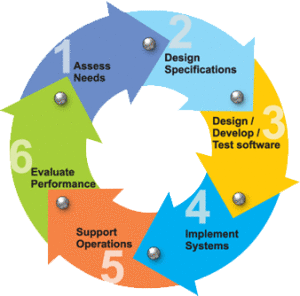The IT project manager has a special assignment; he or she not only presides over the planning and execution of a business project, but also has special knowledge of technical subjects. Usually IT project managers are hired to work in construction, casting, architecture, aerospace, networking, telecommunications and software creation.
The goal is to bring a task in the IT field to completion. A project manager, by job description, must be intricately involved in planning, designing and executing an agenda. This also involves controlling and monitoring employees to make sure the project is completed. Although this is a technical field, the project manager’s role is a very social one. He or she must ask questions of employees, superiors and acquaintances so that everything continues going as planned.
Assumptions are dangerous in business and eventually lead to conflicts, or worse yet, an unfinished or unprofessional handled project. Project managers must recognize risk, and confront any employee assumptions that might inhibit the project’s completion.
Roles of the IT Project Manager
The IT project manager is usually assigned over just an IT department of a medium to large company, unless he/she works as a consultant. In addition to planning, defining and supervising the project, the IT manager also develops schedules, estimates time, does resource planning and estimates cost. All procedures must be documented and careful attention should be given to risk analysis and reporting on all steps of the project.
The IT project manager is not merely a born leader but an educated one, one who thoroughly understands team leadership and strategic influencing. He doesn’t merely manage but works beyond the team, often forging relationships with business partners, vendors and higher management or owners.
Scalability is a crucial issue, particularly if the PM is a consultant, or is not working exclusively with one company. Scalability means you can work with a variety of business models, from small startups to middle range, to even large corporations, and take on any number of complex projects. While you ultimately answer to senior management, when it comes time to get the project done, you are in charge of whatever resources the company has to offer.
The Challenges Involved
Much of the challenge in working as a project manager is in creating a practical world view. You will find that with as many people as you talk to on a regular basis, that they are all correct and yet limited because of their own context. You must think broadly and yet with attention to detail.
It’s interesting to note that many businesses creating problems by not selecting the right project manager for a complex tasks. In fact, part-time managers often create more problems than they can fix, since effective use of company resources requires an intricate understanding of the company innerworkings and is a full-time job.
The IT Project Manager will have special interest in technical fields, particularly in informational technology. However, the role is not merely an engineer or programmer. Technical requirements must also involve transactional skills and transformational skills.
Transactional duties concern work flow and performance, whereas transformational duties are more concerned with the management of people and relationships.
The technical aspects of the job are where the PM will be most active. Since an IT PM has studied technical skills, he/she may tackle programming or engineering issues personally. This is particularly important in the project definition stage.
Some say that a project manager in the IT field is a sort of superhero, since he/she has the task of motivating other people to follow the protocol and take full responsibility for the end result. This is a good analogy, since visionary leaders work best as project managers. It’s not merely a strict accounting supervisory role, but really one where you can excel by showcasing your interpersonal qualities.
Now don’t get the wrong idea. The PM does not have to micromanage everybody, nor does he/she have to completely understand every employee’s skill set or approach. The PS simply must make sure the employee is competent and challenge them to make sure they understand all details of their particular assignment. The situation becomes slightly more complex if you as an IT PM supervise other project managers, or answer to another project manager.
IT Project Manager Skills and Tasks Expectations
The IT project manager’s duties can be broken down into some specific steps:
- Creating progress reports
- Prepare and review a risk register on a periodic basis
- Organize weekly meetings
- Review progress with primary employees of the team
- Handle all approvals of orders and invoices
- Provide updates to the sponsor, or management, which could require anything from visiting in person, to a phone call or even a Skype call.
- Instruct new team members on how to begin their task
- Be involved in marketing
- Produce a project newsletter or blog
When it comes to cultivated skills, naturally, information technology knowledge is required. This involves using computer hardware and software for telecommunications. Storing, retrieving, transmitting and manipulating data is the IT expert’s dominion and this can encompass many individual skills.
For example, computer network installation is important for offices who want Internet or intranet access. Even television and telephone issues are now considered part of the IT industry, because of worldwide connectivity. Not only must the IT PM understand the hardware and software, but he/she must also know how to use advanced telecom equipment, e-commerce tools, semiconductors and various types of electronics.
This doesn’t necessarily mean that you will be working with all types of companies; nor does it mean you will be limited to covering IT aspects only. For example, the skill set you need to manage an IT department of a computer company will require a different approach than a pharmaceutical company. There will be a different company agenda. There will be very different sets of company culture to learn.
However, it should be noted that project manager theory, and transaction and transformational know-how, are actually the same or very similar even across multiple fields. The main difference is in the technical aspects of the job, and this you must pay careful attention to when applying.
It’s not really enough to apply for an IT job and say, “I understand IT.” What companies are looking for is a project manager who can work with employees that specialize in IT. Naturally, you can’t bluff your way through this. Knowing the technology, even if you’re not a specialist, allows you to quickly understand the agenda and assimilate the information.
IT PM Training, Education and Work Experience

Business experience requested is typically three years of leading experience, as well as a proven record of managing employees, delegating work, and of course, in the appropriate field with regard to technical knowledge. You may also have to possess skills like Agile, Scrum, PMP, or have experience in using a Software Development Life Cycle (SDLC).
Project managers do not require licensing, but certifications are definitely worth thinking about. Certification, which is industry support by your own peers, can give you an edge over the competition, and speak to the confidence others have in your knowledge. Certification also allows you greater earning positions and the opportunity for rapid advancement.
You can earn certification in a number of categories and or industries:
- Project Management Professional Certification
- Certified Associate in Project Management
- Program Management Professional
- PMS Agile Practitioner
- PMI in Business Analysis
- PMI Risk Management
For further assistance with certification, contact the Project Management Institute. It is a non-profit organization that helps PMs with certification worldwide and is considered one of the most accepted standards in the industry. Demonstrating PMP certification through a recognized organization is what you will need to prove to a new company that you have the skills and confidence to be a leader.
Staying Up to Date
There is also a need to prove to new employers that you keep up to date with the latest trends in the industry. For example, do you have a Twitter or Facebook account and follow the most important pages? Do you regularly read news updates on your industry, not only Project Management, but the field you specialize in? Are you constantly learning new information as it is made available or do you become complacent with what you already know?
Including your Twitter and Facebook accounts on your resume is a great way to impress a potential employer and interviewer, who will see first hand how seriously you take your career.
This is a great opportunity for motivated and visionary leaders who want to help take a company to the top. With the right training, experience and skill sets there is nothing preventing you from excelling in this field.
- CCNA vs CCNP-Which Certification is Best for You? - March 30, 2021
- The Network Administrator Job Description and Salary Guide - July 21, 2020
- Health Information Management Job Description and Salary Expectations - December 14, 2019






No Comments